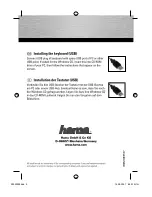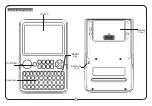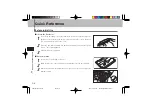
7
씈
INTRO/ENDING button
When the Style mode is selected, this is used to
control the Intro and Ending functions. (See
pages 49, 51.)
씉
MAIN A/B (AUTO FILL) buttons
When the Style mode is selected, these are used
to change auto accompaniment sections and
control the Auto Fill function. (See page 54.)
씊
CHORD GUIDE button
When the Style mode is selected, this is used to
control the Chord Guide functions. (See page
62.)
씋
RECORD button
This is used for selecting and enabling the
recording functions: Song (pages 80, 84), EZ
Chord (page 68), and One Touch Setting (page
72).
씌
ONE TOUCH SETTING / SONG MEMORY
buttons
When the Style mode is selected, these are used
to select the One Touch Setting registrations
(page 73). When the Song mode is selected,
these are used to select specific tracks (pages 81,
85).
씍
HARMONY button
This turns the Harmony effect on and off. (See
page 43.)
씎
REVERB button
This turns the Reverb effect on and off. (See
page 40.)
씏
DUAL button
This turns the Dual mode on and off. (See page
34.)
TOUCH button
This turns the Touch function on and off. (See
page 38.)
Power switch (STANDBY/ON)
DEMO button
This is used to play the Demo songs. (See page
16.)
PANEL CONTROLS AND TERMINALS
Rear Panel
쐃
DC IN 10-12V jack
This is for connection to a PA-3B AC power
adaptor. (See page 8.)
쐇
PHONES/OUTPUT jack
This is for connection to a set of stereo head-
phones or to an external amplifier/speaker
system. (See page 9.)
쐋
FOOT SWITCH jack
This is for connection to an optional FC4 or FC5
Footswitch. The footswitch is generally used to
control sustain, but it can conveniently be set to
control one of a variety of functions instead.
(See pages 9, 91.)
쐏
MIDI IN, OUT terminals
These are for connection to other MIDI instru-
ments and devices. (See page 94.)
PHONES/
OUTPUT
DC IN 10-12V
IN
OUT
MIDI
FOOT SWITCH
쐃
쐇
쐏
쐋
5








































